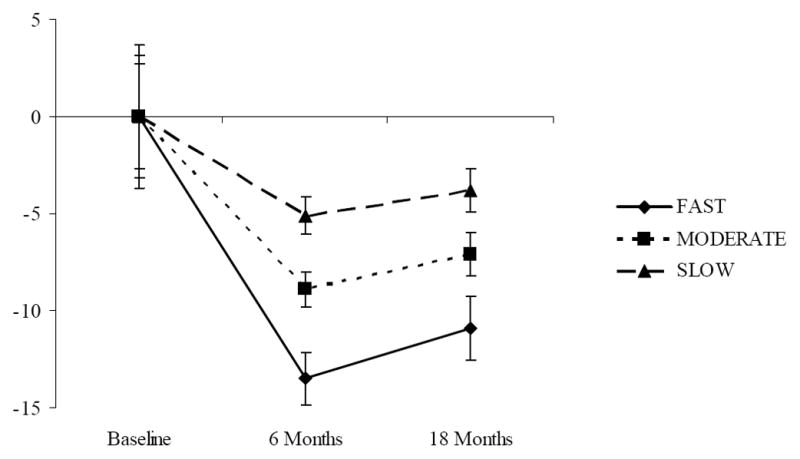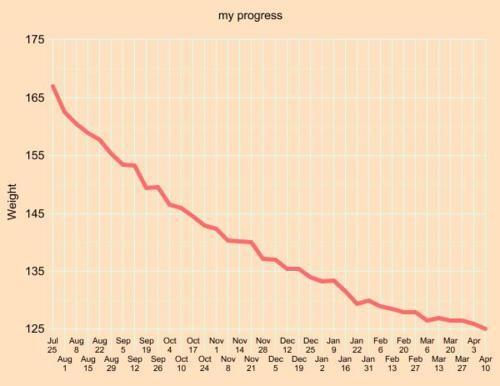If you clicked here, you’re probably thinking something along the lines of the following: “Right on! Gimme gimme gimme some sweet weight loss TIPS! I need a quick weight loss diet that lets me get this over with in a hurry, preferably without too much effort or for too long. How can I lose the weight, and lose it fast???”
It’s probably safe to assume that everybody who’s in the market for losing weight shares at least some of this attitude. But—and it’s a big BUT—is quick weight loss good for you? Is it effective in the long run? Shouldn’t you instead be seeking gradual weight loss, you know, that whole “slow and steady wins the race” thing?Actually, the research says “No.”But before we get into the subject of how to whisk that fat right off of your frame, we need to discuss a couple of important things:
- What is the healthiest and most effective weight loss goal?
- What does “fast” weight loss look like, anyway?
Choosing an Effective Weight Loss Goal
How would you like to lose five pounds in a week, then keep them off forever? How would you like to keep shedding weight rapidly beyond the first five? It’s totally doable, many have done it, and there’s no reason the next person to do it can’t be you.
What does this kind of success take? First and foremost, it takes a goal.
But your goal shouldn’t be just any goal. It shouldn’t be I want to lose “some” weight, nor should it be Let’s give this a try and see what happens. No; your goal, if you’re going to have any real and lasting success, needs to be some version of I’m in it to WIN IT. I’m going to lose some SERIOUS weight. As described elsewhere on this site, one of the necessary components to success, one of the hard pieces of the puzzle, is to “decide that you are going to make it happen this time, and that you’re going to make it last.”
You may be thinking at this moment, “Please just get to the point already and tell me how to lose weight fast! That’s what I came here for! Enough with this pep talk stuff—what does the DIET look like?”
You don’t understand. Without a concrete goal, it doesn’t matter what the diet looks like—you’re going to fail at it. Even if you at first succeed, you’re going to gain it all back.
This is not just our opinion, it’s science. According to The American Journal of Clinical Nutrition, Eating Behaviors Journal, The International Journal of Behavioral Medicine, The Lancet Journal of Diabetes & Endocrinology, and far more publications than we have the time to catalog for you, the consensus is:
To Become Small, Go Big
Take a look at some of the truly surprising findings of these medical journals. Even though you’ve probably always heard that it’s best to “cut back a little” and make other “gradual changes” to your diet, the researchers have found that the opposite is true:
- People who make drastic changes to their diets, rather than moderate changes, not only lose weight faster right off the bat, they also lose more weight in the long run, AND they do a better job of maintaining their weight.
- In case you missed it, let’s see that again: a plan to “make small changes that you can keep up long-term” is LESS effective in both the short and long terms than is a plan to “hit it hard and make it happen ASAP!“
-

Average results after 6 and 18 months. The “Fast First Month’s Weight Loss” group is at the bottom, the Slow group at the top, with Moderate in the middle, naturally. Those who lose weight faster in the first month of a long-term weight loss program lose more for each of the next 5 months, and regain less weight in the following year than do those whose initial weight loss was slower. In fact, in one study, the “Fast” initial weight loss group was more than 5 times more likely to achieve long-term weight loss success than the “Slow” group. Just take a look at this graph of the study’s findings:
- The instant regain or “bounce back” that many people experience after a rapid weight loss is often due to the person’s too-hasty abandonment of the program. In the first week of a “strict” weight loss program, much of the weight loss, sometimes 5 or more pounds, is due to the loss of excess water that had been trapped in body tissue, as well as large amounts of intestinal contents (use your imagination) being evacuated and not entirely replaced (due to reduced intake). A person who thinks, “Nice, my pants fit again! Mission Accomplished” has not accomplished nearly as much as she thought she did–and if she resumes her old ways, her body will take just a few days to revert to its former weight.
So you see that the well-meaning advice you’ve heard, and maybe given, “Don’t set too big of a goal for yourself, or you’ll just be more upset if you don’t succeed” is 180-degrees opposite of what actually works. In reality, it makes you more likely to fail.
Similarly, “Don’t lose too much at once, you’ll just bounce back that much faster” is also yesterday’s advice.
In fact, weight loss is one of the only things in life for which the lyrics of a typical Disney song actually work: if you simply believe you can achieve big things—and you act on those beliefs—you will.

How Fast and How Far Can You Go?
The results are in: fast weight loss is the best weight loss! Now that you’re all revved up and ready to Lose, Baby, Lose!, you’ve probably realized that there’s another question: how fast is “fast”?
Fast is 10 to 20 pounds in your first month, depending on your starting weight, your intake, and your exercise.
However, a more important question is: “When I’m rapidly losing weight, what might cause my weight loss to hit the brakes and screech to a halt?” We can learn a lot in answer to this question by examining what those in the studies who failed at meaningful weight loss shared in common, such as:
- Unrealistic expectations of how rapidly the weight would come off (sure, you can lose weight fast–but it will take longer than you want it to)
- Poor body image and low self-confidence (weight loss doesn’t just happen to you–you MAKE it happen through attitude and gratitude)
- Lesser early weight loss (rapid early results propel you forward and supercharge your spirit; mediocre results lead to the early demise of your program as you groan, “Why bother?”)
- Sporadic program adherence (we already told you: you must decide that you are going to DO this, and do it right—no prisoners, no excuses)
- Greater tendency to feel guilty or like a failure (attitude is paramount! You must not give up nor give in—you WILL succeed if you keep it up).
As you can see, ALL of the things that go hand in hand with failure involve a lack of mental preparation or resiliency. The key to effective weight loss is not just an effective diet, it’s an effective mindset.
There’s not just one diet that works. Virtually any diet will produce results when implemented with the right attitude and the willingness to do what it takes to make it succeed. All the diets that promise fast weight loss: almost all of them do work. if and WHEN the person on them wills them to work.
How do you make your diet succeed?
You stick with it through thick and thin, until you achieve your goal (this is why we don’t recommend any particular diet at The Real You Is Skinny; most of them are too boring or difficult to keep up for the long term—but learning the basics of eating well in general allows you to have more freedom in your diet, which leads to long-term success).
The Biggest Challenge in Your Weight Loss Journey
Rapid weight loss kicks ass. It’s such a natural high! It’s why people who lose a lot of weight in the first month of their program have an easier time sticking with it.
But your body can’t keep shedding the pounds at that pace forever. The less overweight you are, the harder it is to lose weight. This is for many reasons, most of which are physiological, but many of which are psychological. The point is, your weight loss will slow over time.
The challenge is to keep vigilant after the high has worn off, and after you don’t need to lose that weight quite so badly anymore, and when the same amount of effort produces less amazing results now than it did in the beginning.
Take, for example, my progress (hi, this is Alyssa!) as documented in The Real You Is Skinny (the book):

Look at those awesome early results. How much more effort I was putting in at first, when my weight was dropping like a rock, compared to the later months, when it was barely budging?
None. In fact, I was eating way better, and exercising way more, during the latter part of my journey. It’s just that our bodies are like that sometimes. Weight loss, and then weight maintenance, requires effort, and it will continue to require an effort for as long as you desire to stay lean.
Conclusion
Can you lose weight fast? Of course you can. But can you become The Real You fast?
Don’t answer that; it was a trick question.
The Real You isn’t something you become, it’s someone you are. It’s the person you know you can be, the person underneath it all, perhaps hidden by fat at the moment, but ready to be revealed. The real you doesn’t seek a “quick fix” where you go through hell just to lose a little weight that you’re going to gain back again in a fit of regret and self-loathing.
No, the real you is you at your best, happiest weight, having won the war against a deadly enemy (literally), having grown in strength and character, having learned that losing weight “fast” isn’t enough, but it’s only the first step in becoming the healthy, whole person you can be.
In an article in the near future, we will discuss what a proper Goal Weight looks like. In the meantime, consider what you’ve read today. Consider that you don’t need to short-change yourself in your weight loss. Your Goal Weight doesn’t have to be merely what you think you can manage—it can be the weight that you truly dream of achieving, the weight when you can look at yourself in the mirror and say, “I did it. I’ve arrived.”
As you’ve seen, the research shows that, so long as you recognize and admit that it will still take time:
The bigger the dream, the bigger the victory.
So dream big. Put in the effort, and one day you’ll wake up small.

